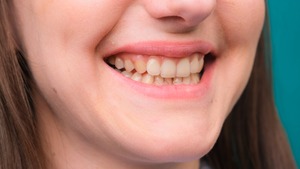
Even though you practice good oral hygiene habits, you’ve still had to deal with discolored teeth for most of your life. This could actually be something you got from your parents; some people don’t realize it, but genetics can have a significant impact on the appearance of teeth. Here’s a closer look at how tooth discoloration and genetics can be linked – as well as how cosmetic dentistry can be used to address the problem and enhance your smile.
How Can Genetics Affect the Color of Your Teeth?
Your genes determine how thick and translucent the enamel protecting your teeth is, which can influence the color of your smile. Thick enamel often results in whiter-looking teeth. Conversely, thinner enamel can make the underlying yellowish dentin layer more visible, thus leaving you with a duller-looking smile.
On top of that, some people have hereditary conditions that affect the way their teeth look. For instance, dentinogenesis imperfecta results in unusually brittle teeth and is associated with grayish, transparent enamel. Another example is amelogenesis imperfecta, which affects enamel formation and can leave you with yellow, brown, or gray teeth.
Obviously, genetics is not the only possible explanation for discolored teeth. Oral hygiene habits, diet, and the use of tobacco products can all have an impact on the way your smile looks. It’s important to be aware of all the factors that could be contributing to dental discoloration so that you can pursue an appropriate solution.
How Can Your Dentist Help with Discolored Teeth?
Your dentist has more than one way to help you achieve a brighter smile. In some cases, they may give you an at-home whitening kit. Said kit will contain professional-grade bleaching gel along with customized trays. If you fill the trays with the gel and wear them for a set amount of time each day, you’re likely to notice a significant improvement in the color of your smile after about two weeks.
It should be noted that teeth whitening doesn’t always work on more severe types of discoloration. In these cases, your dentist may suggest metal-free dental crowns instead. By completely covering your teeth with a natural-looking restoration, it’s possible to hide discolored areas from view. This can be a particularly great option for patients with dentinogenesis imperfecta, as dental crowns can help strengthen and protect brittle teeth.
Regardless of whether your discolored teeth are caused by genetics or not, it’s always worth taking whatever steps you can to make the dazzling, more confident smile of your dreams a reality. Don’t hesitate to reach out to your dentist to see what cosmetic solutions they have to offer.
About the Author
Dr. Salma Helal went to the University of Minnesota School of Dentistry, and she completed a one-year general practice residency program in Seattle that gave her training in a variety of advanced dental procedures. At Crescent Dental in New Brighton, she can help patients enhance their smiles with multiple forms of cosmetic dentistry, including teeth whitening and metal-free dental crowns. If you’re bothered by discolored teeth, you can schedule a consultation with Dr. Helal by visiting her website or calling (763) 571-4837.

